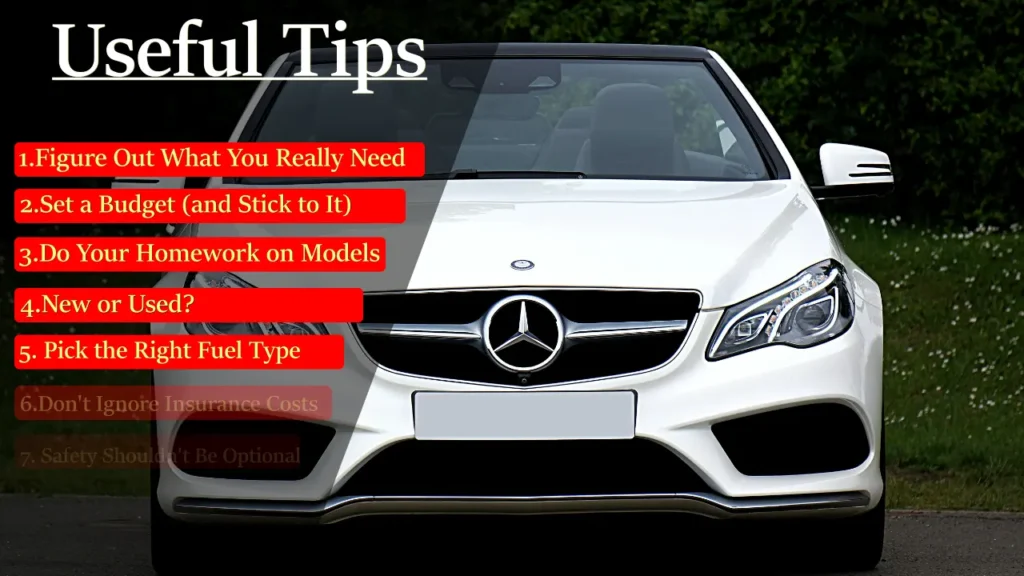Tips to Consider Before Buying a Car 2025
Buying a car is exciting. You imagine the smell of a brand-new cabin, the feel of the steering wheel, maybe even the first road trip you’ll take. But between that dream and reality lies one very tricky part — choosing the right car without regretting it later.
I’ve seen friends rush into buying a shiny model they spotted in an ad, only to realize a few months later that it didn’t fit their needs, guzzled fuel, or had sky-high maintenance costs. To help you avoid that, here’s my list of 12 tips to consider before buying a car in 2025.
- Tips to Consider Before Buying a Car 2025
- 1. Figure Out What You Need
- 2. Set a Budget (and Stick to It)
- 3. New or Used?
- 4. Do Your Homework on Models
- 5. Pick the Right Fuel Type
- 6. Don't Ignore Insurance Costs
- 7. Safety Shouldn't Be Optional
- 8. Take a Real Test Drive
- 9. Compare Loan Options Before Saying Yes
- 10. Think About Service & Maintenance
- 11. Keep Resale Value in Mind
- 12. Don't Be Afraid to Negotiate
1. Figure Out What You Need
- Be brutally honest with yourself here. Are you mostly driving in the city or hitting the highways every weekend? Do you need space for five adults, or is it just you and the occasional passenger?
- If your daily drive is a cramped city commute, a small hatchback or a hybrid might be perfect. But if you’ve got a big family or love road trips, maybe you should be looking at SUVs
2. Set a Budget (and Stick to It)
- It’s easy to get carried away when you’re standing in a showroom surrounded by gleaming cars. But remember, it’s not just the price tag. You’ll have to pay for registration, insurance, fuel, maintenance, and maybe a loan.
- A simple rule? Keep your car expenses under 15% of your monthly income so you don’t end up resenting your dream ride.
3. New or Used?
- Both have their charm. A new car smells amazing, comes with a warranty, and you know exactly what you’re getting. A used car, on the other hand, is easier on the pocket and won’t lose value the moment you drive it out of the showroom.
- If you do go the used route, check the service history, get a mechanic’s opinion, and don’t skip a test drive.
4. Do Your Homework on Models
- This part can be fun. Compare safety ratings, features, engine types, and reviews. Watch videos, read owner experiences, and talk to friends who own the model you’re eyeing.
- Sometimes, a car that looks perfect on paper might have minor annoyances that only daily drivers notice.
5. Pick the Right Fuel Type
- Petrol cars are smooth but can cost more to run. Diesels give you better mileage but have higher maintenance. Electric cars are cheap to “fuel” and eco-friendly, but charging points are still catching up.
- Hybrids? A nice middle ground, but they do cost more upfront.
6. Don’t Ignore Insurance Costs
- Two cars with the same price tag can have very different insurance premiums. Safety features, repair costs, and accident records all play a part. Sometimes paying a bit more for a safer car saves you money every year on insurance.
7. Safety Shouldn’t Be Optional
I can’t stress this enough. Make sure your car has ABS, airbags (at least two, but six is better), ESC, and proper parking aids. These aren’t “luxuries” anymore — they’re essentials.
8. Take a Real Test Drive
Don’t just go around the block with the salesperson chatting in your ear. Try the car in traffic, on open roads, over potholes. Adjust the seat, check the visibility, and see if you feel comfortable after 20–30 minutes behind the wheel.
9. Compare Loan Options Before Saying Yes
Dealerships will happily offer you financing, but it’s worth checking banks and credit unions, too. Even a half-percent difference in interest rates can save you a big chunk over the years.
10. Think About Service & Maintenance
A great car can turn into a headache if the nearest service center is 200 km away or if spare parts are prohibitively expensive. A quick online search can tell you a lot about the brand’s after-sales reputation.
11. Keep Resale Value in Mind
It might feel weird to think about selling a car before you even buy it, but some models hold their value way better than others. Popular SUVs and hatchbacks often sell faster and for a better price later on.
12. Don’t Be Afraid to Negotiate
Salespeople expect it. Know the market price, ask about discounts, and don’t be afraid to walk away if it doesn’t feel right. There’s always another car — and another deal.
Final Thoughts
Buying a car isn’t just about finding something that looks good in your driveway. It’s about making sure it fits your life, your budget, and your plans. If you keep these tips in mind, you’ll drive away happy — and stay that way for years to come.

